Book contents
- Frontmatter
- Contents
- Preface
- PART ONE Family Law and the Meaning of Divorce
- PART TWO Parenthood in the Enduring Family
- PART THREE Parents Forever?
- PART FOUR The Family Law System and the Enduring Family
- 8 Dispute Resolution for the Enduring Family
- 9 Adjudication for the Enduring Family
- PART FIVE Financial Transfers in the Enduring Family
- PART SIX The Future of Family Law
- Index
- References
8 - Dispute Resolution for the Enduring Family
Published online by Cambridge University Press: 01 March 2011
- Frontmatter
- Contents
- Preface
- PART ONE Family Law and the Meaning of Divorce
- PART TWO Parenthood in the Enduring Family
- PART THREE Parents Forever?
- PART FOUR The Family Law System and the Enduring Family
- 8 Dispute Resolution for the Enduring Family
- 9 Adjudication for the Enduring Family
- PART FIVE Financial Transfers in the Enduring Family
- PART SIX The Future of Family Law
- Index
- References
Summary
In the new conceptualization of postdivorce parenting, the family does not go through a death so much as a metamorphosis from a nuclear household to become a family in two locations, with new relationships extending the range of adults and children associated with that family. If the family is understood to be enduring in spite of the breakdown of the parents' relationship, then the improvement of the relationship between parents so that they will be more likely to cooperate into the future emerges as an important goal of services to support families following separation.
What does that mean for dispute resolution? Around the western world, there has been a shift in thinking about the role of dispute resolution in promoting enduring family relationships, but dispute resolution still tends to occur, in many countries, within a context of case management of disputes by courts.
MEDIATION AS AN ALTERNATIVE TO LITIGATION
Alternative dispute resolution processes, notably mediation, have long played a role as an alternative to litigation in family law disputes. In many jurisdictions, it is a requirement before a case can proceed to trial. These dispute resolution strategies emerged as alternatives to lawyer-led negotiation and adjudication in the event that settlement negotiations failed.
The development of alternative dispute resolution as part of the process of resolving cases through the courts was the beginning of a recognition that disputes about parenting after separation should not be regarded as merely a legal problem requiring the interventions of lawyers and courts for its resolution.
- Type
- Chapter
- Information
- Family Law and the Indissolubility of Parenthood , pp. 183 - 196Publisher: Cambridge University PressPrint publication year: 2011

